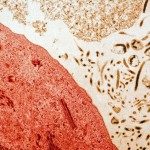Lien vers Pubmed [PMID] – 24421914
PLoS Negl Trop Dis 2014;8(1):e2637
The pathogenesis of Lassa fever (LF), a hemorrhagic fever endemic to West Africa, remains unclear. We previously compared Lassa virus (LASV) with its genetically close, but nonpathogenic homolog Mopeia virus (MOPV) and demonstrated that the strong activation of antigen-presenting cells (APC), including type I IFN production, observed in response to MOPV probably plays a crucial role in controlling infection. We show here that human macrophages (MP) produce large amounts of CC and CXC chemokines in response to MOPV infection, whereas dendritic cells (DC) release only moderate amounts of CXC chemokines. However, in the presence of autologous T cells, DCs produced CC and CXC chemokines. Chemokines were produced in response to type I IFN synthesis, as the levels of both mediators were strongly correlated and the neutralization of type I IFN resulted in an inhibition of chemokine production. By contrast, LASV induced only low levels of CXCL-10 and CXCL-11 production. These differences in chemokine production may profoundly affect the generation of virus-specific T-cell responses and may therefore contribute to the difference of pathogenicity between these two viruses. In addition, a recombinant LASV (rLASV) harboring the NP-D389A/G392A mutations, which abolish the inhibition of type I IFN response by nucleoprotein (NP), induced the massive synthesis of CC and CXC chemokines in both DC and MP, confirming the crucial role of arenavirus NP in immunosuppression and pathogenicity. Finally, we confirmed, using PBMC samples and lymph nodes obtained from LASV-infected cynomolgus monkeys, that LF was associated with high levels of CXC chemokine mRNA synthesis, suggesting that the very early synthesis of these mediators may be correlated with a favourable outcome.


